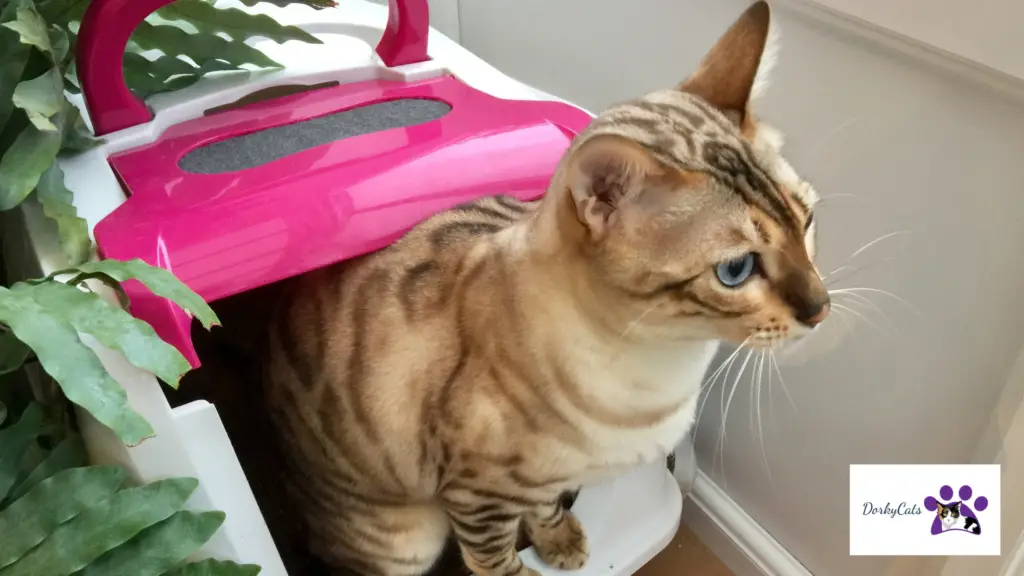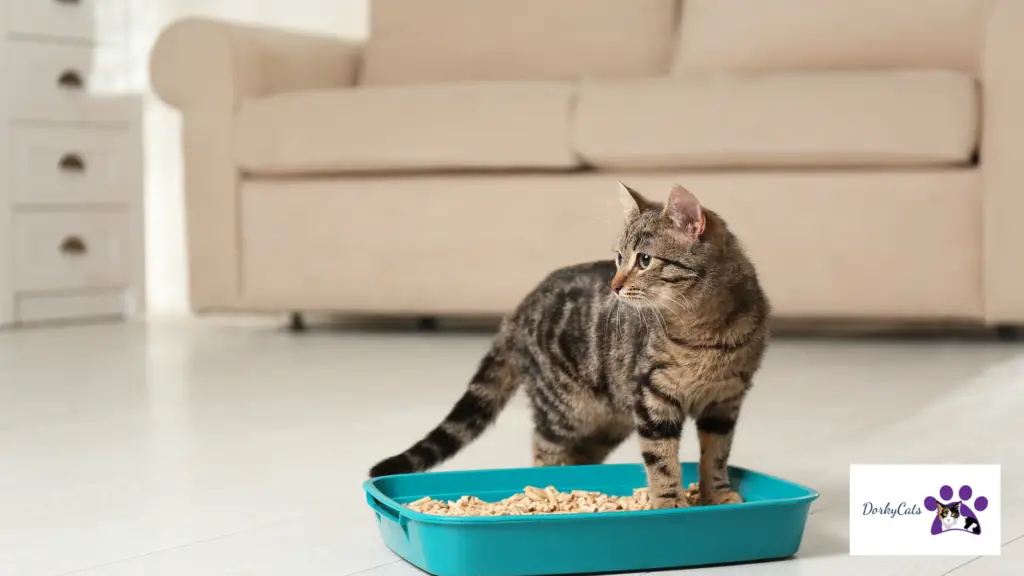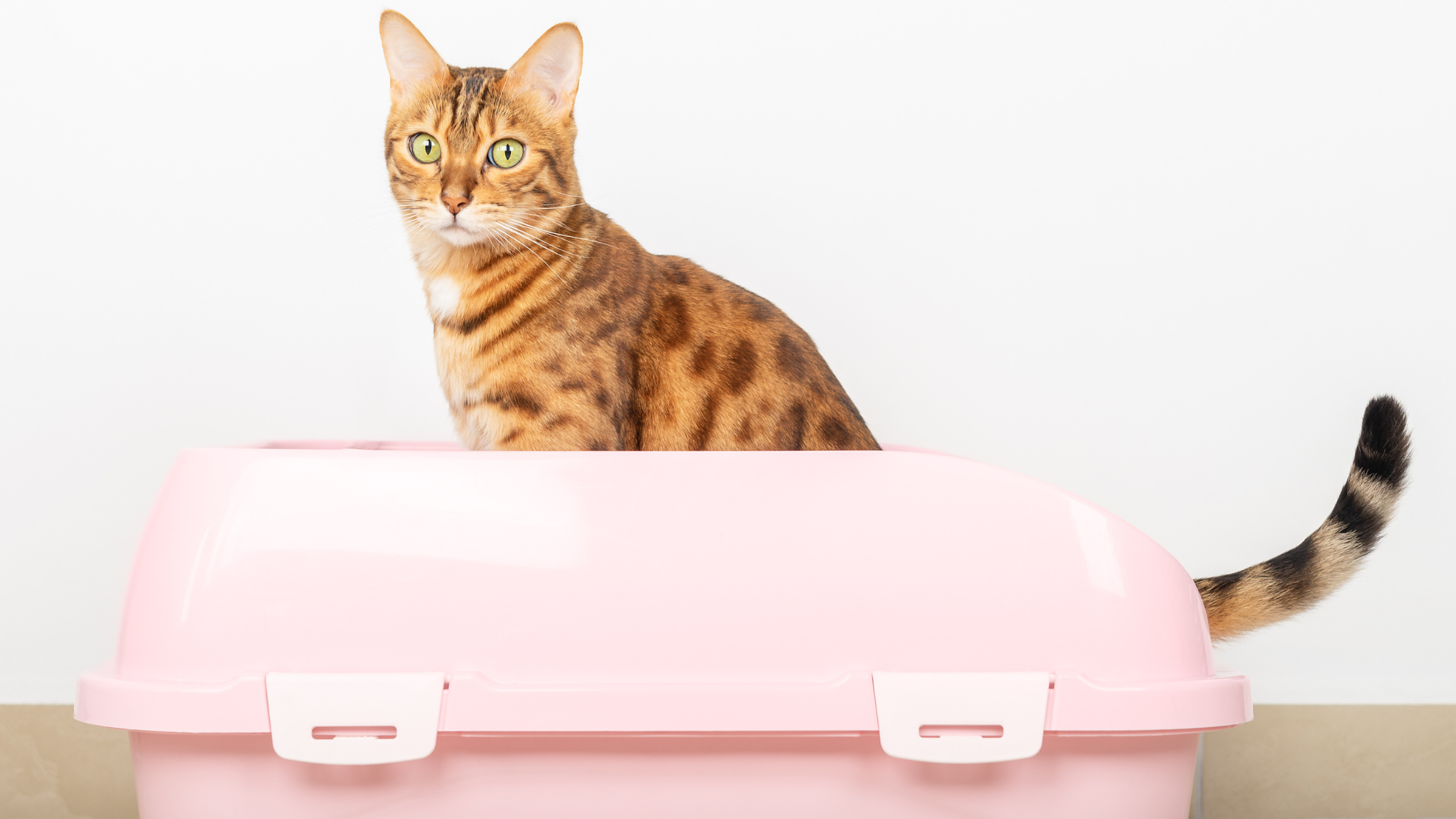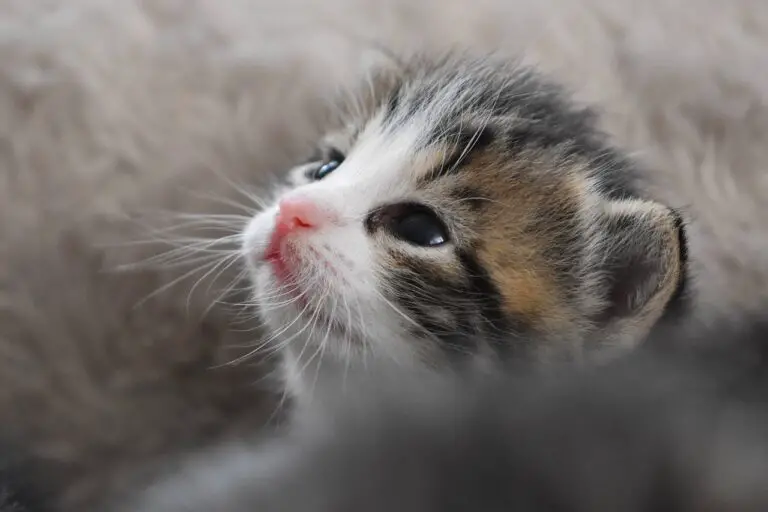CAN CATS FIND THEIR LITTER BOX IF YOU MOVE IT?
Can cats find their litter box if you move it? Unfortunately, some cats can get confused if you move the litter box location. But there are some things you can do to ensure your cat can find the toilet!
Cats can generally find their litter box even if it is moved if it is too far or hidden in an unfamiliar place. However, sudden changes may cause confusion or stress. Therefore, moving the litter box gradually is better than keeping it in an accessible and familiar location.
Here is how to move the litter box properly without creating too much confusion with your cat.

DO CATS GET CONFUSED WHEN YOU MOVE THEIR LITTER BOX?
Some cats can become confused or stressed when their litter box is moved to a new location.
This is because cats strongly associate with their litter box and its location, and changes to this routine can cause them to feel disoriented or anxious. A
dditionally, the new location of the litter box may be less accessible, less private, or otherwise unappealing to the cat.
It is important to gradually change the litter box routine and consider the cat’s comfort and preferences.
Providing plenty of positive reinforcement, such as treats and praise, when the cat uses the litter box can help them to adjust to the new location and increase their confidence. In addition, a behaviorist may be helpful.
CAN CATS FIND THEIR LITTER BOX IF YOU MOVE IT? AND HOW?
Cats combine their sense of smell and memory to find their litter box. They have a strong sense of smell and can associate their waste’s scent with their litter box’s location.
Additionally, cats have good spatial memory, so they can remember where their litter box is even if it is moved. It is also helpful to keep the litter box in a familiar and easily accessible location to reduce stress and confusion for the cat.
CAN CATS FIND THEIR LITTER BOX IN THE DARK?
Cats can find their litter box in the dark.
They have excellent night vision and can see well in low-light conditions. Additionally, their sense of smell is very keen, and they can associate the scent of their waste with the location of their litter box, even in the dark.
However, keeping the area around the litter box lit is always a good idea, as this can reduce stress and increase the cat’s comfort and confidence.
CAN CATS SMELL THEIR LITTER BOX?

Yes, cats have a very keen sense of smell and can detect the scent of their litter box. In fact, a dirty or poorly maintained litter box can be unappealing to a cat and cause them to avoid using it.
Even if you place the litter box in a different place, usually, cats should be able to smell the new location. However, some cats might still be confused and go to the bathroom in the old place, on the floor.
Some cats may have preferences for certain types of litter or litter box placement, so it is a good idea to pay attention to the cat’s behavior and make adjustments as needed.
HOW LONG DOES IT TAKE FOR A CAT TO USE THE LITTER BOX IN A NEW HOME?
The amount of time it takes for a cat to start using the litter box in a new home can vary depending on several factors, such as the cat’s age, personality, and prior litter box training.
However, it is common for it to take a few days to a week for a cat to feel comfortable and start using the litter box in a new environment. In my experience, you might have to bring the litter box to your cat twice a day during the first few days.
It can be helpful to provide a familiar and consistent routine for the cat, such as keeping the litter box in a similar location as in their previous home and offering plenty of positive reinforcement, such as treats and praise, when they successfully use the litter box.
It is also essential to be patient and understanding, as moving to a new home can be a stressful and disorienting experience for cats.
WHAT IS THE WORST PLACE FOR THE LITTER BOX?
The worst place for a litter box is any location that is inconvenient, uncomfortable, or stressful for the cat.
Some examples of poor litter box placement include:
- In a high-traffic area where the cat may feel exposed or vulnerable while using the litter box
- In a dark, cramped, or poorly ventilated area, which may make the cat feel enclosed or trapped
- Near the cat’s food and water dishes, as cats naturally avoid eliminating near their eating area
- In a noisy or busy area, such as near a washing machine or in a room with loud children
- In an area with strong or unpleasant odors, such as near a garbage can or litter box for another pet.
It is essential to place the litter box in a quiet, accessible, and hygienic location that is convenient for the cat and to provide enough litter boxes (at least one per cat, plus one extra) to reduce competition and stress.
DO CATS WANT PRIVACY WHEN USING THE LITTER BOX?
Yes, most cats prefer privacy when using their litter box. They instinctively prefer to eliminate in a quiet and secluded area, away from their environment’s distractions and potential dangers.
Providing a litter box that is easily accessible but also private and secluded can increase a cat’s comfort and reduce stress, which can, in turn, encourage them to use the litter box more consistently.
Having a litter box placed in a quiet and secluded area, away from high-traffic areas and noisy distractions can help cats feel more secure and comfortable using the litter box.
I MOVED MY CAT’S LITTER BOX, AND NOW SHE WON’T USE IT; WHY?

If your cat was previously using the litter box and has suddenly stopped after you moved it, there could be several reasons for this change in behavior. Some common causes include:
- Stress: Moving the litter box to a new location can be stressful for some cats, causing them to avoid using it.
- Location: The new location of the litter box may be too far away, inaccessible, or not private enough for the cat.
- Scent: The cat may be unable to locate the litter box because it no longer has a familiar scent.
- Dirty or unpleasant litter box: The cat may avoid using it if it is dirty or otherwise unappealing.
- Health issues: Sometimes, a sudden change in litter box use can signify an underlying health problem, such as a urinary tract infection or constipation.
If your cat is avoiding the litter box, it is a good idea to clean the box thoroughly and return it to its previous location or a nearby location that is familiar and accessible to the cat.
You can also try changing the type of litter or adding a comforting scent, such as lavender, to the litter box. If the problem persists, it is always a good idea to consult with a veterinarian to rule out any underlying health issues.
WHERE IS THE BEST PLACE TO PUT KITTY LITTER?
The best place to put a litter box for a cat is in a quiet, easily accessible, and private location. Some ideal locations include:
- A bathroom or laundry room that people do not frequently use
- A spare room or a closet that can be dedicated to the litter box
- A quiet corner of a room that is out of the way of high-traffic areas
It is also important to place the litter box on a sturdy, flat surface that is easily cleaned and not too close to the cat’s food and water dishes.
It is also essential to regularly clean the litter box to maintain a fresh and hygienic environment for the cat. Finally, it is essential to monitor the cat’s behavior and make any necessary adjustments to the location or type of litter box based on their preferences and comfort.
HOW DO CATS FIND THEIR LITTER BOX?
Cats have a strong instinct to bury their waste and often instinctively know where to find their litter box.
This is happening because of the following:
- Scent: Cats have a keen sense of smell, and the scent of their urine and feces can help guide them to their litter box.
- Location: Cats prefer a specific location for their litter box and repeatedly return to the same spot.
- Consistency: Cats prefer routine and consistency, and they will often seek out their litter box at the same time each day.
Choose a comfy litter for your cat:










FREQUENTLY ASKED QUESTIONS
Do cats prefer covered or uncovered litter boxes?
Cats can have individual preferences regarding litter boxes, some prefer covered boxes, and others prefer uncovered boxes.
Covered litter boxes offer privacy and help contain odors, which can appeal to some cats. However, they can also be more enclosed and confining, making some cats feel stressed or trapped.
Uncovered litter boxes offer more openness and accessibility, which can appeal to some cats. They are also easier to clean and monitor, as there are no sides or tops to obstruct the view of the litter.
Is it normal for a cat not to use the bathroom after moving?
It is not uncommon for a cat to experience a temporary change in litter box behavior after moving to a new home. This can be due to stress, anxiety, or changes in the cat’s environment that affect its comfort level.
Are cats protective of their litter box?
Some cats may display territorial behavior towards their litter box, especially if there are multiple cats in the household or if the litter box is located in a highly-trafficked area.
This behavior can include aggressive or defensive body language, such as growling or swatting when another cat or person comes near their litter box.
In such cases, it is essential to provide each cat with its own designated litter box and to locate the boxes in separate, quiet, and easily accessible locations.






